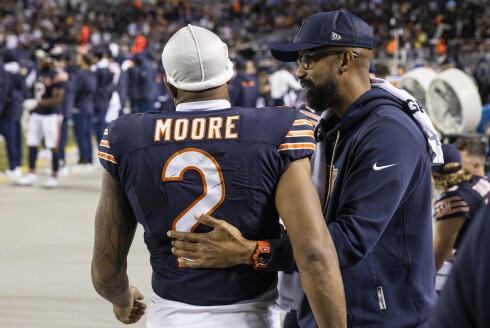There were always disclaimers when Bears quarterback Caleb Williams had bad games as a rookie. They were valid, too, considering the many missteps of the coaching staff, the unstable offensive line, the implosion of the season at large and the many things a rookie must learn through experience.
None of those applies anymore. The stakes — and scrutiny — are much higher for Williams in his second season. He floundered as the Bears squandered a double-digit lead in the fourth quarter Monday against the Vikings and lost their season opener 27-24.
After a 10-for-10 start, Williams completed only nine of his next 21 passes. During that stretch from the middle of the second quarter to late in the fourth, when the Bears were outscored 24-10, he threw for 82 yards and had a 54.1 passer rating.
The Bears needed a spark to pull them out of their nosedive, and Williams wasn’t it.
‘‘In those moments, it doesn’t necessarily come down to somebody doing anything outstanding,’’ he said. ‘‘It comes down to being able to go out there and be together, all 11 doing our job at one time as soon as the ball is snapped.’’
For Williams, that job is largely to go through his progressions properly and make accurate throws. That has been an ongoing problem during his time with the Bears, and he has yet to find an answer for it.
When the subject arises, Williams seems as mystified as anyone. Head coach Ben Johnson has mentioned that his footwork needs to be tightened up — ‘‘If you’re not aligned properly from the ground up, then you’re going to have inconsistencies with your target,’’ he said — and has been working with Williams on straightening that out for months.
The results weren’t there Monday. ESPN Analytics charted Williams as being off-target on 29.4% of his passes, the worst in the NFL in Week 1.
That’s a rough start toward Johnson’s expectation that Williams complete 70% of his passes this season. And Johnson, who said the chance to coach Williams was a compelling reason for him to join the Bears, thought he was ‘‘up and down,’’ which led to mixed results for the offense.
‘‘There were some things that he did that were top-notch, and I would put him up there with some of the best in the NFL,’’ Johnson said Tuesday. ‘‘He had a couple of throws with guys in his face that he delivered on target that were very tough. . . . Yet there were still some that we would like to have back. There were probably three or four of them that we counted on tape, at a minimum, that we would want back.
‘‘He’s very self-reflective on it and very critical of himself. It’s a starting point for us, and we’re looking to get better next week.’’
It was only one game, so Johnson will remain patient. But keep in mind that every player is under evaluation this season, including Williams. Johnson isn’t going to stand by while the quarterback quite literally throws away his first head-coaching opportunity.
Johnson, not Williams, is the most powerful figure in the organization at the moment. This is nothing like last season, when head coach Matt Eberflus and offensive coordinator Shane Waldron talked at times as though Williams was their boss. Johnson gives him strict demands, and he’ll find someone else if Williams ultimately can’t meet them.
That conversation is still pretty far down the road. Right now, Johnson is working to correct Williams’ errors from Monday and get a better performance Sunday at the Lions.
Realistically, it’ll take time for Williams and Johnson to click. Midseason is a reasonable timeline for that. In the meantime, it can’t look this bad. Not when Williams has everything he needs.
The Bears got him the coach everyone, including him, wanted. They spent nine figures remodeling their offensive line. They used the No. 10 overall pick on tight end Colston Loveland to add to an already-talented group of skill players.
All the explanations for the lows of last season have expired. Williams won’t be treated like a rookie anymore, and he certainly can’t keep playing like one.


